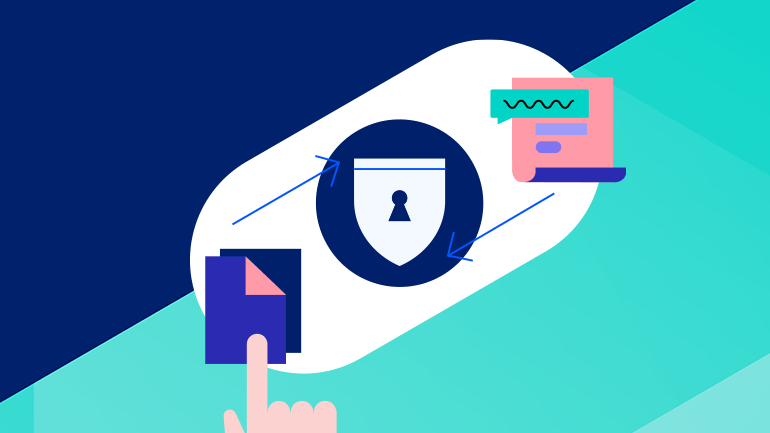Why Your Patient Data Deserves Better Than Email Attachments

Healthcare’s data-sharing addiction meets compliance reality. Learn why modern MFT solutions aren’t just nice to have—they’re the vital infrastructure helping keep PHI secure and your auditors happy.
It’s 4:47 p.m. on a Friday and Dr. Chen needs Mrs. Patterson’s lab results now. Your lab tech thinks, “I’ll just email these over quick.”
Stop right there.
That impulse—the one where you choose convenience over compliance—puts sensitive patient data at risk in a world where healthcare organizations consistently rank among the top industries for data breaches. Bad actors want health records, and they’re ready to take advantage of any organization’s reliance on ungoverned and legacy tools.
The Healthcare Data Transfer Problem
Healthcare runs on data. Patient records, lab results, insurance claims, medical images, prescription information—all critical data that needs to move securely between providers, facilities and systems. Yet surprisingly, many healthcare organizations are still relying on file transfer methods that would make security experts break out in hives.
When Grandma’s MRI needs to get from the imaging center to her specialist, doctors and their administrative team are not thinking about encryption protocols. But their IT team should be.
Common Mistakes in Healthcare Data Transfer
The healthcare sector faces unique challenges when transferring sensitive patient information:
| Data Transfer Method | Why It’s Still Used | Why It’s Problematic |
|---|---|---|
| Email attachments | Quick and familiar | Unsecured transmission, multiple copies stored across servers |
| FTP servers | “It’s always worked” | Lacks encryption, audit trails and access controls |
| USB drives | Easy physical transfer | Easily lost/stolen, no tracking or encryption |
| Legacy systems | Cost of replacement | Often lack modern security features or integration capabilities |
Each of these methods creates significant compliance risk. That physician who just texted a patient photo to a colleague? That’s a HIPAA violation with potential fines starting at $100 per incident and reaching up to $50,000 each.
The Compliance Elephant in the Room
Healthcare organizations don’t just need secure file transfers—they’re legally required to have them. The regulatory landscape is complex and unforgiving.
HIPAA: America’s Healthcare Security Guardian
HIPAA requirements for electronic Protected Health Information (ePHI) aren’t suggestions—they’re federal mandates. The Security Rule specifically requires:
- Transmission security (encryption)
- Access controls
- Audit controls (logging who accessed what and when)
- Integrity controls (verifying data hasn’t been altered)
🎯 Reality Check: If you’re using basic FTP, email or consumer cloud storage for transferring patient data, you’re almost certainly violating HIPAA requirements. Full stop.
GDPR: Europe’s Data Protection Powerhouse
For organizations handling European patient data, GDPR raises the stakes even higher:
- Explicit consent requirements for data processing
- Right to be forgotten (data deletion)
- Breach notification within 72 hours
- Potential fines of up to 4% of global annual revenue
These aren’t theoretical concerns. In 2024 alone, healthcare organizations faced over $12 million in HIPAA fines.
Why Outdated File Transfer Methods Are Clinical Time Bombs
Let’s say an overworked administrator needs to send 200 patient records to your billing department. They dump everything into a ZIP file, password-protect it with “Hospital123!” and attach it to an email—copying three people because they’re not sure who’s handling billing this week.
That single action just led to:
- Four copies of unencrypted PHI (sender’s outbox, email server and three recipients’ inboxes)
- Zero audit trail of who accessed the data
- Zero verification that the right people received it
- Zero ability to revoke access if sent to the wrong person
It’s the digital equivalent of leaving patient files on a bench in the hospital lobby with a sticky note saying, “For Billing—Please don’t look if you’re not Billing.”
The MFT Cure: Modern Solutions for Modern Healthcare
Modern Managed File Transfer (MFT) solutions like Progress MOVEit software are designed specifically to address these healthcare data transfer challenges. They’re not just fancy file-sending tools—they’re comprehensive platforms that help users move patient data securely, compliantly and efficiently.
The Core Components of Healthcare-Ready MFT
A proper healthcare MFT solution delivers:
- Encryption: Data is encrypted both in transit and at rest, better protecting PHI.
- Audit trails: File access, transfer and modification are logged and timestamped.
- Authentication and access controls: Multi-factor authentication and role-based permissions restrict sensitive information access to authorized personnel.
- Automated workflows: Recurring transfers happen automatically, reducing human error and improving consistency.
- System integration: Connect with EHR systems, laboratory information systems and other healthcare-specific platforms.
Real-World Healthcare MFT in Action
In the UK, regional laboratories are using MFT solutions to transform their test result distribution. Instead of manual processes prone to error, results automatically flow to:
- General practitioners who ordered the tests
- Hospital specialists monitoring patient care
- Secure data lakes for long-term record retention
This automation allows patients to get faster care and helps the organization maintain security and compliance.
💡 Quick win: Progress MOVEit software supports connections for many protocols and systems, making it ideal for healthcare environments with a mix of modern and legacy systems. No more “our old system can’t talk to the new one” excuses!
The Legacy System Challenge
One of healthcare’s biggest file transfer challenges is connecting modern systems with the legacy applications that many institutions still rely on. The industry is notorious for running critical functions on decades-old technology—often for good reasons like stability and specialized functionality.
Modern MFT platforms like MOVEit shine here, offering connectivity to other systems, from mainframes to cloud services, without requiring massive infrastructure changes. This bridge between old and new means organizations can:
- Maintain existing workflows while improving security
- Gradually modernize without disrupting patient care
- Apply consistent security policies across systems
- Eliminate manual “swivel chair” processes between systems
Beyond Basic Compliance: Certification Matters
Here’s something most vendors won’t tell you: There’s a massive difference between “HIPAA-enabling” and “HIPAA-certified.” Many solutions claim to help you meet HIPAA requirements, but few actually undergo rigorous third-party auditing to verify their claims.
When evaluating an MFT solution, look for vendors who:
- Maintain HIPAA compliance
- Undergo regular SOC 2 Type II audits
- Have HITECH certification
- Provide detailed compliance documentation
⚠️ Warning: Not all “HIPAA-compliant” claims are created equal. Progress MOVEit Cloud software undergoes rigorous third-party auditing for HIPAA, HITECH and other regulatory frameworks. We don’t just enable compliance, we prove it.
Making the Move to Modern MFT
Transitioning from legacy file transfer methods to a secure MFT solution doesn’t have to be painful. The best approach is phased:
- Assess: Identify your highest-risk data flows and compliance gaps.
- Prioritize: Focus first on patient-facing processes and known compliance issues.
- Implement: Deploy your MFT solution with a focus on these priority areas.
- Train: Equip staff with an understanding of both the how and why of secure file transfers.
- Expand: Gradually bring additional workflows into your secure MFT environment.
Most healthcare organizations see immediate benefits from this approach—reducing both security risks and operational headaches without disrupting critical care processes.
The Bottom Line: Patient Trust Depends on Data Security
When patients share their most sensitive health information, they’re placing immense trust in your organization. Every unsecured file transfer betrays that trust. Beyond compliance and avoiding fines, implementing proper MFT solutions is about honoring the fundamental responsibility healthcare providers have to protect patient data.
The choice is clear: Continue with risky ad-hoc file transfers and pray you don’t face financial or reputational consequences or implement a proper MFT solution that helps you protect your patients, your staff and your organization.
Ready to transform your healthcare file transfers from a security risk into a compliance strength? Learn more about how Progress MOVEit software is helping healthcare organizations worldwide by reading this comprehensive whitepaper on modernizing healthcare data transfers.
Your patients deserve nothing less than the most secure handling of their sensitive information. It’s time your file transfer methods reflected that commitment.

Adam Bertram
Adam Bertram is a 25+ year IT veteran and an experienced online business professional. He’s a successful blogger, consultant, 6x Microsoft MVP, trainer, published author and freelance writer for dozens of publications. For how-to tech tutorials, catch up with Adam at adamtheautomator.com, connect on LinkedIn or follow him on X at @adbertram.
